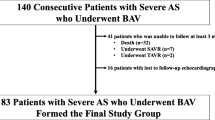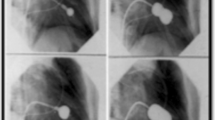Opinion statement
Vasodilator therapy is designed to reduce regurgitant volume and improve left ventricular function. Acute administration reduces vascular resistance and decreases regurgitant volume and left ventricular filling pressure. These effects may be clinically useful in acute regurgitations, but less consistent results have been reported in long-term therapy. In chronic mitral functional regurgitation, vasodilator therapy has proved to have clinical or prognostic benefit only when heart failure or poor ventricular function is present. The indication of vasodilator treatment in aortic regurgitation has raised significant controversy. Several studies with small series have shown beneficial effects on regurgitant volume, ejection fraction, and mass of the left ventricle. Nevertheless, in the only two randomized long-term follow-up studies, results differed completely. In our experience, both nifedipine and enalapril failed to reduce the need for valvular surgery or show benefits in echocardiographic parameters. Vasodilator therapy would be indicated only in patients with severe aortic regurgitation and systemic hypertension, or when surgery is contraindicated.
Similar content being viewed by others
References and Recommended Reading
Levine HJ, Gaasch WH: Vasoactive drugs in chronic regurgitant lesions of the mitral and aortic valves. J Am Coll Cardiol 1996, 28:1083–1091.
Kim YJ, Jones M, Shiota T, et al.: Effect of load alterations of the effective regurgitant orifice area in chronic aortic regurgitation. Heart 2002, 88:397–400.
Reimold SC, Byrne JG, Caguioa ES: Load dependence of the effective regurgitant orifice area in a sheep model of aortic regurgitation. J Am Coll Cardiol 1991, 18:1085–1090.
Cooper HA, Gersh BJ: Treatment of chronic mitral regurgitation. Am Heart J 1998, 135:925–936.
Greenberg B, Massie B, Bristow JD, et al.: Long-term vasodilator therapy of chronic aortic insufficiency. A randomized double-blinded, placebo-controlled clinical trial. Circulation 1988, 78:92–103.
Lin M, Chiang H, Lin S, et al.: Vasodilator therapy in chronic asymptomatic aortic regurgitation: enalapril versus hydralazine therapy. J Am Coll Cardiol 1994, 24:1046–1053.
Banaszewski M, Rydlewska-Sadowska W, Rubkiewicz S: Captopril or nifedipine? Comparison of rest and exercise acute effects and long-term therapy in chronic isolated asymptomatic moderate to severe aortic regurgitation. J Heart Valve Dis 1998, 7:488–499.
Schön HR, Dorn R, Barthel P, Schömig A: Effects of 12 months of quinapril therapy in asymptomatic patients with chronic aortic regurgitation. J Heart Valve Dis 1994, 3:500–509.
Sondergaard L, Aldershvile J, Hildebrandt P, et al.: Vasodilatation with felodipine in chronic asymptomatic aortic regurgitation. Am Heart J 2000, 139:667–674.
Wisenbaugh T, Sinovich V, Dullabh A, Sareli P: Six month pilot study of captopril for mildly symptomatic, severe isolated mitral and isolated aortic regurgitation. J Heart Valve Dis 1994, 3:197–204.
Scognamiglio R, Fasoli G, Ponchia A, Dalla-Volta S: Long-term nifedipine unloading therapy in asymptomatic patients with chronic severe aortic regurgitation. J Am Coll Cardiol 1990, 16:424–429.
Gaasch WH, Sundaram M, Meyer TE: Managing asymptomatic patients with chronic aortic regurgitation. Chest 1997, 111:1702–1709.
Novo S, Pinto A, Abrignani MG, et al.: Calcium channel blockers and peripheral arterial flow in normal and in hypertensive subjects. Am J Nephrol 1986, 6(suppl 1):87–90.
Evangelista A, Tornos P, Sambola A, et al.: Long-term vasodilator therapy in patients with severe aortic regurgitation. N Engl J Med 2005, 353:1342–1349. This prospective randomized trial of nifedipine, enalapril, and no treatment in chronic, asymptomatic severe AR failed to show that vasodilator had any benefit in reducing the need for surgery or in echocardiographic variables. Patients with moderate-severe hypertension were excluded and blood pressure reduction was not obtained in the patients treated with vasodilators.
Bolen JL, Alderman EL: Hemodynamic consequences of afterload reduction in patients with chronic aortic regurgitation. Circulation 1976, 53:879–883.
Shen WF, Roubin GS, Hirasawa K, et al.: Noninvasive assessment of acute effects of nifedipine on rest and exercise hemodynamics and cardiac function in patients with aortic regurgitation. J Am Coll Cardiol 1984, 4:902–907.
Rothlisberger C, Sareli P, Wisenbaugh T: Comparison of single-dose nifedipine and captopril for chronic severe aortic regurgitation. Am J Cardiol 1993, 72:799–804.
Reske SN, Heck I, Kropp J, et al.: Captopril mediated decrease of aortic regurgitation. Br Heart J 1985, 54:415–419.
Scognamiglio R, Rahimtoola SH, Fasoli G, et al.: Nifedipine in asymptomatic patients with severe aortic regurgitation and normal left ventricular function. N Engl J Med 1994, 331:689–694.
Gaasch WH, Schick EC: Symptoms and left ventricular size and function in patients with chronic aortic regurgitation. J Am Coll Cardiol 2003, 41:1325–1328.
Manyari DE, Yunus A: Nifedipine in severe aortic regurgitation. N Engl J Med 1995, 332:1302–1303.
Bonow RO, Carabello B, Chatterjee K, et al.: ACC/AHA 2006 Guidelines for the management of patients with valvular heart disease. A report of the American College of Cardiology/American Heart Association Task Force on Practice Guidelines. J Am Coll Cardol 2006, 48:e1-e148. These guidelines present a comprehensive review of valvular heart disease, including MR and AR, with detailed discussion of the recommendations for vasodilator therapy in the acute and chronic phases.
Yoran C, Yellin EL, Becker RM, et al.: Mechanism of reduction of mitral regurgitation with vasodilator therapy. Am J Cardiol 1979, 43:773–777.
Chatterjee K, Parmley WW, Swan HJ, et al.: Beneficial effects of vasodilator agents in severe mitral regurgitation due to dysfunction of subvalvular apparatus. Circulation 1973, 48:684–690.
Weiland DS, Konstam MA, Salem DN, et al.: Contribution of reduced mitral regurgitant volume to vasodilator effect in severe left ventricular failure secondary to coronary artery disease or idiopathic dilated cardiomyopathy. Am J Cardiol 1986, 58:1046–1050.
Pfeffer MA, Braunwald E, Moye LA, et al.: Effect of captopril on mortality and morbidity in patients with left ventricular dysfunction after myocardial infarction. Results of the survival and ventricular enlargement trial. N Engl J Med 1992, 327:669–677.
Evangelista-Masip A, Bruguera-Cortada J, Serrat-Serradell R, et al.: Influence of mitral regurgitation on the response to captopril therapy for congestive heart failure caused by idiopathic dilated cardiomyopathy. Am J Cardiol 1992, 69:373–376.
Greenberg BH, DeMots H, Murphy E, Rahimtoola SH: Arterial dilators in mitral regurgitation: effects on rest and exercise hemodynamics and long-term clinical follow-up. Circulation 1982, 65:181–187.
Wisenbaugh T, Sinovich V, Dullabh A, Sareli P: Six month pilot study of captopril on left ventricular performance in severe mitral regurgitation. Am J Cardiol 1992, 69:348–353.
Schön HR, Schröter G, Blömer H, Schöming A: Beneficial effects of a single dose of quinapril on left ventricular performance in chronic mitral regurgitation. Am J Cardiol 1994, 73:785–791.
Host U, Kelback H, Hildebrandt P, et al.: Effect of ramipril on mitral regurgitation secondary to mitral valve prolapse. Am J Cardiol 1997, 80:655–658.
Tischler MD, Rowan M, LeWinter MM: Effect of enalapril therapy on left ventricular mass and volumes in asymptomatic chronic, severe mitral regurgitation secondary to mitral valve prolapse. Am J Cardiol 1998, 82:242–245.
Dujardin KS, Sarano M, Bailey KR, et al.: Effect of losartan on degree of mitral regurgitation quantified by echocardiography. Am J Cardiol 2001, 87:570–576.
Perry GJ, Wei CC, Hankes GH, et al.: Angiotensin II receptor blockade does not improve left ventricular function and remodeling in subacute mitral regurgitation in the dog. J Am Coll Cardiol 2002, 39:1374–1379.
Nemoto S, Hamawaki M, De Freitas G, Carabello BA: Differential effects of the angiotensin-converting enzyme inhibitor lisinopril versus the beta-adrenergic receptor blocker atenolol on hemodynamics and left ventricular contractile function in experimental mitral regurgitation. J Am Coll Cardiol 2002, 40:149–154.
Scognamiglio R, Negut Ch, Palisi M, et al.: Long-term and functional results after aortic valve replacement in asymptomatic patients with chronic severe aortic regurgitation and left ventricular dysfunction. J Am Coll Cardiol 2005, 45:1025–1030. This controversial study suggests that treatment with nifedipine before surgery has a protective effect after surgery. Nifedipine allows one to indicate surgery with a reduced ejection fraction with low mortality and an optimal long-term outcome. By contrast, patients with reduced ejection fraction and not treated with nifedipine presented irreversible myocardial damage despite prompt surgery.
Plante E, Lachance D, Gaudreau M, et al.: Effectiveness of beta-blockade in experimental chronic aortic regurgitation. Circulation 2004, 110:1477–1483.
Author information
Authors and Affiliations
Rights and permissions
About this article
Cite this article
Evangelista, A., Tornos, P., Sambola, A. et al. Role of vasodilators in regurgitant valve disease. Curr Treat Options Cardio Med 8, 428–434 (2006). https://doi.org/10.1007/s11936-006-0030-x
Issue Date:
DOI: https://doi.org/10.1007/s11936-006-0030-x




